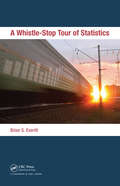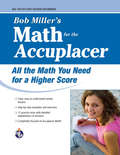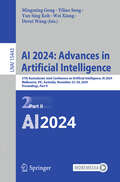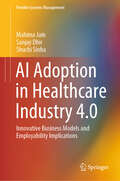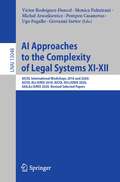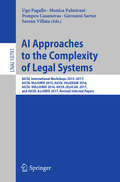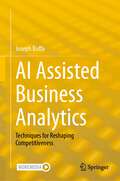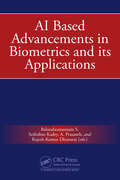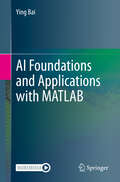- Table View
- List View
A Visual Introduction to Differential Forms and Calculus on Manifolds
by Jon Pierre FortneyThis book explains and helps readers to develop geometric intuition as it relates to differential forms. It includes over 250 figures to aid understanding and enable readers to visualize the concepts being discussed. The author gradually builds up to the basic ideas and concepts so that definitions, when made, do not appear out of nowhere, and both the importance and role that theorems play is evident as or before they are presented. With a clear writing style and easy-to- understand motivations for each topic, this book is primarily aimed at second- or third-year undergraduate math and physics students with a basic knowledge of vector calculus and linear algebra.
A Wealth of Numbers
by Benjamin WardhaughDespite what we may sometimes imagine, popular mathematics writing didn't begin with Martin Gardner. In fact, it has a rich tradition stretching back hundreds of years. This entertaining and enlightening anthology--the first of its kind--gathers nearly one hundred fascinating selections from the past 500 years of popular math writing, bringing to life a little-known side of math history. Ranging from the late fifteenth to the late twentieth century, and drawing from books, newspapers, magazines, and websites, A Wealth of Numbers includes recreational, classroom, and work mathematics; mathematical histories and biographies; accounts of higher mathematics; explanations of mathematical instruments; discussions of how math should be taught and learned; reflections on the place of math in the world; and math in fiction and humor. Featuring many tricks, games, problems, and puzzles, as well as much history and trivia, the selections include a sixteenth-century guide to making a horizontal sundial; "Newton for the Ladies" (1739); Leonhard Euler on the idea of velocity (1760); "Mathematical Toys" (1785); a poetic version of the rule of three (1792); "Lotteries and Mountebanks" (1801); Lewis Carroll on the game of logic (1887); "Maps and Mazes" (1892); "Einstein's Real Achievement" (1921); "Riddles in Mathematics" (1945); "New Math for Parents" (1966); and "PC Astronomy" (1997). Organized by thematic chapters, each selection is placed in context by a brief introduction. A unique window into the hidden history of popular mathematics, A Wealth of Numbers will provide many hours of fun and learning to anyone who loves popular mathematics and science.
A Whistle-Stop Tour of Statistics
by Brian EverittThe book is intended as a quick source of reference and as an aide-memoir for students taking A-level, undergraduate or postgraduate statistics courses. It includes numerous examples, helping instructors on such courses by providing their students with small data sets with which to work.
A Young Generation Under Pressure?: The Financial Situation and the "Rush Hour" of the Cohorts 1970 - 1985 in a Generational Comparison
by Joerg TremmelJustice between generations is still not as prominent on any agenda as justice between rich and poor or men and women. For the first time, this three-part book explores the situation of young people of today in comparison to their direct predecessors. The first part, The Financial Situation of the Young Generation in a Generational Comparison, deals with this generation's financial standing; the second part, The Rush Hour of Life, examines their time restrictions. Both are considered from a life-course perspective. The third part, On the Path to Gerontocracy?, addresses the demographic shift in favor of the elderly in aging Western democracies.
A-Plus Notes for Algebra: Algebra 2 and Pre-Calculus
by Rong YangSimple and Easy to Study and Review 1. It has 19,000 examples and exercises, from simple to complex. 2. It outlines the concepts, formulas, and theorems in algebra. 3. It facilitates the learning process in problem-solving. 4. It is good for SAT, ACT, GRE, GMAT, NTE and H.S Exit.
A-Plus Notes for Beginning Algebra: Pre-Algebra and Algebra 1
by Rong YangSimple and Easy to Study and Review 1. It has 19,000 examples and exercises, from simple to complex. 2. It outlines the concepts, formulas, and theorems in algebra. 3. It facilitates the learning process in problem-solving. 4. It is good for SAT, ACT, GRE, GMAT, NTE and H.S Exit.
A.C. Pigou and the ‘Marshallian’ Thought Style: A Study In The Philosophy And Mathematics Underlying Cambridge Economics (Palgrave Studies In The History Of Economic Thought)
by Karen Lovejoy KnightThis book provides a study of the forces underlying the development of economic thought at Cambridge University during the late nineteenth century and the first half of the twentieth century. The primary lens it uses to do so is an examination of how Arthur Cecil Pigou’s thinking, heavily influenced by his predecessor, Alfred Marshall, evolved. <p><p> Aspects of Pigou’s context, biography and philosophical grounding are reconstructed and then situated within the framework of Ludwik Fleck’s philosophy of scientific knowledge, most notably by drawing on the notions of ‘thought styles’ and ‘thought collectives’. In this way, Knight provides a novel contribution to the history of Pigou's economic thought.
A.D. Alexandrov: Selected Works Part II: Intrinsic Geometry of Convex Surfaces (Classics of Soviet Mathematics)
by S. S. KutateladzeA.D. Alexandrov is considered by many to be the father of intrinsic geometry, second only to Gauss in surface theory. That appraisal stems primarily from this masterpiece--now available in its entirely for the first time since its 1948 publication in Russian.Alexandrov's treatise begins with an outline of the basic concepts, definitions, and r
A1-Algebraic Topology over a Field (Lecture Notes in Mathematics #2052)
by Fabien MorelThis text deals with A1-homotopy theory over a base field, i.e., with the natural homotopy theory associated to the category of smooth varieties over a field in which the affine line is imposed to be contractible. It is a natural sequel to the foundational paper on A1-homotopy theory written together with V. Voevodsky. Inspired by classical results in algebraic topology, we present new techniques, new results and applications related to the properties and computations of A1-homotopy sheaves, A1-homology sheaves, and sheaves with generalized transfers, as well as to algebraic vector bundles over affine smooth varieties.
ABC Math Book (STEAM Baby for Infants and Toddlers)
by Dori Roberts Stewart MSHelp your little one learn letters and math together—an ABC math book for kids ages 0 to 3 Give your little learner a jump-start with this fun, inspiring way to master their ABCs. From Abacus to Zero, this ABC book introduces young children to foundational mathematical concepts with each letter of the alphabet, doubling the learning and fun while giving your toddler a head start on their education. The ABC Math Book features: Levels of discovery—Explore a tiered learning approach that grows with your child. Focus first on letters, then words, and finally, understanding concepts. Colorful images—Keep your child engaged with rich and vibrant illustrations that add to their learning. Full S.T.E.A.M. ahead—Encourage a lifelong love of learning with all the books in the S.T.E.A.M. Baby series. Foster an excitement for learning in your little one with this fun exploration of letters and mathematical concepts.
ABC's of Science
by Charles A. OliverThis books is about alpha, beta, and gamma. These are the first three letters of the Greek alphabet. <P> <P> This alphabet was the major method of written communication in ancient times, and is of course still used today. The Greek letters are also the most commonly used symbols in science. In all branches of science, we use symbols to represent ideas and definitions. Symbols serve to simplify communication and calculations—once you get used to them, that is.
ACCUPLACER®: Bob Miller's Math Prep (College Placement Test Preparation)
by Mr. Bob MillerGet a Higher Math Score on the Accuplacer with REA’s NEW Bob Miller Test Prep! If you’re one of the millions of students attending community college this year, REA has the perfect Accuplacer test prep for you - Bob Miller’s Math for the Accuplacer. Written in a lively and unique format, Bob Miller’s Math for the Accuplacer is an excellent tool for students who have been recently admitted to college and who want to improve their math skills before taking the Accuplacer exam. The book explains math concepts in a lively, easy-to-grasp style. Each chapter includes numerous step-by-step examples and exercises. Detailed explanations of solutions help students understand and retain the material. Bob’s targeted review section covers all the math topics tested on the Accuplacer, including arithmetic (17 questions on the test), elementary algebra (12 questions on the test), and college-level math (20 questions on the test). To help you get the most out of your Accuplacer preparation, Bob has included four practice tests for each section – for a total of 12 exams. Our test-taking advice, study tips, and exam strategies will prepare you for exam day, ease your anxiety, and help you boost your score. Packed with Bob Miller’s engaging examples and practical advice, this book is a must for any student preparing for the Accuplacer! What is the Accuplacer? The Accuplacer exam is used to determine which math courses are appropriate for newly enrolled college students. It is popular in community colleges and both two- and four-year schools.
ACT Math Prep For Dummies: Book + 3 Practice Tests Online
by Mark ZegarelliImprove your score on the math section of the ACT A good math score on the ACT exam can set you on the path to a number of rewarding college programs and future careers, especially in the STEM fields. ACT Math Prep For Dummies walks you through this challenging exam section, with simple explanations of math concepts and proven test-taking strategies. Now including access to an all-new online test bank—so you can hammer out even more practice sessions—this book will help you hone your skills in pre-algebra, algebra, geometry, trigonometry and beyond. Handy problem-solving tips mean you’ll be prepared for the ever-more-advanced questions that the ACT throws at students each year. Learn exactly what you’ll need to know to score well on the ACT math section Get tips for solving problems quicker and making good guesses when you need to Drill down into more complex concepts like matrices and functions Practice, practice, practice, with three online testsIf you’re a high school student preparing to take the ACT and you need extra math practice, ACT Math Prep For Dummies has your back.
ACT Test Prep Flash Cards: Algebra 2 - Trigonometry Review (Exambusters ACT Workbook #9 of 13)
by Ace Inc.500 questions and answers that focus on essential advanced algebra and trigonometry concepts.<P><P> Includes complementary diagrams. Topics: Linear Equations, Quadratics, Conic Sections, Logarithms, Trig. Functions, Sequence and Series, and more. <P><P><i>Advisory: Bookshare has learned that this book offers only partial accessibility. We have kept it in the collection because it is useful for some of our members. Benetech is actively working on projects to improve accessibility issues such as these.</i><P><P>
ACT Test Prep Flash Cards: Algebra Review (Exambusters ACT Workbook #7 of 13)
by Ace Inc.450 questions and answers that highlight introductory algebra definitions, problems, and concepts.<P><P> Topics: Algebraic Concepts, Sets, Variables, Exponents, Properties of Numbers, Simple Equations, Signed Numbers, Monomials, Polynomials, Additive and Multiplicative Inverse, Word Problems, Prime Numbers, Factoring, Algebraic Fractions, Ratio and Proportion, Variation, Radicals, Quadratic Equations. <P><P><i>Advisory: Bookshare has learned that this book offers only partial accessibility. We have kept it in the collection because it is useful for some of our members. Benetech is actively working on projects to improve accessibility issues such as these.</i><P><P>
ACT Test Prep Flash Cards: Arithmetic Review (Exambusters ACT Workbook #6 of 16)
by Ace Inc.600 questions and answers highlight <P><P><i>Advisory: Bookshare has learned that this book offers only partial accessibility. We have kept it in the collection because it is useful for some of our members. Benetech is actively working on projects to improve accessibility issues such as these.</i><P><P> essential arithmetic definitions, problems, and concepts. <P><P>Topics: Addition, Subtraction, Multiplication, and Division of Whole Numbers; Fractions and Decimals, Multiplication Tables, Word Problems, Percents, Measurement, Metric System, Square Roots and Powers, Real Numbers, Properties of Numbers.
ACT Test Prep Flash Cards: Geometry Review (Exambusters ACT Workbook #8 of 13)
by Ace Inc.450 questionsand answers that focus on essential geometry theorems, postulates, concepts, and definitions. Includes complementary diagrams. <P><P>Topics: Lines and Angles, Triangles, Proofs, Perpendicular Lines, Parallel Lines, Angle Sums, Quadrilaterals, Medians, Altitudes and Bisectors, Circles, Ratio and Proportion, Similar Polygons, Circles and Regular Polygons, Coordinate Geometry <P><P><i>Advisory: Bookshare has learned that this book offers only partial accessibility. We have kept it in the collection because it is useful for some of our members. Benetech is actively working on projects to improve accessibility issues such as these.</i><P><P>
AI 2024: 37th Australasian Joint Conference on Artificial Intelligence, AI 2024, Melbourne, VIC, Australia, November 25–29, 2024, Proceedings, Part I (Lecture Notes in Computer Science #15442)
by Wei Xiang Yun Sing Koh Mingming Gong Yiliao Song Derui WangThis two-volume set LNAI 15442-15443 constitutes the refereed proceedings of the 37th Australasian Joint Conference on Artificial Intelligence, AI 2024, held in Melbourne, VIC, Australia, during November 25-29, 2024. The 59 full papers presented together with 3 short papers were carefully reviewed and selected from 108 submissions. Part 1: Knowledge Representation and NLP; Trustworthy and Explainable AI; Machine Learning and Data Mining. Part 2: Reinforcement Learning and Robotics; Learning Algorithms; Computer Vision; AI for Healthcare.
AI 2024: 37th Australasian Joint Conference on Artificial Intelligence, AI 2024, Melbourne, VIC, Australia, November 25–29, 2024, Proceedings, Part II (Lecture Notes in Computer Science #15443)
by Wei Xiang Yun Sing Koh Mingming Gong Yiliao Song Derui WangThis two-volume set LNAI 15442-15443 constitutes the refereed proceedings of the 37th Australasian Joint Conference on Artificial Intelligence, AI 2024, held in Melbourne, VIC, Australia, during November 25-29, 2024. The 59 full papers presented together with 3 short papers were carefully reviewed and selected from 108 submissions. Part 1: Knowledge Representation and NLP; Trustworthy and Explainable AI; Machine Learning and Data Mining. Part 2: Reinforcement Learning and Robotics; Learning Algorithms; Computer Vision; AI for Healthcare.
AI Adoption in Healthcare Industry 4.0: Innovative Business Models and Employability Implications (Flexible Systems Management)
by Sanjay Dhir Shuchi Sinha Mahima JainThis book focuses on the prominent innovative business models and employability implications of artificial intelligence in the healthcare industry 4.0. To do so, it draws upon a rich base of case studies from robotics, virtual assistants, precision medicine, etc., to highlight the possibilities and implications of AI on health care. The book is useful in a variety of ways to the different stakeholders of healthcare sector. It helps medical professionals to understand the impact of the present technologies being adopted and the potential of AI-based technology. The content is of use for the policy makers as it also highlights the managerial and research implications, challenges, opportunities posed by the adoption of AI in healthcare industry 4.0. The rich case study analysis in the area of adoption of AI in healthcare helps generate insights for the academicians and researchers of this field in terms of the parallels drawn between adoptions of AI in healthcare industry 4.0 across the world. It is also useful for management students to understand the key management perspective when healthcare organizations attempt to devise strategies/policies for adoption of AI-driven technologies and processes implementation.
AI Approaches to the Complexity of Legal Systems XI-XII: AICOL International Workshops 2018 and 2020: AICOL-XI@JURIX 2018, AICOL-XII@JURIX 2020, XAILA@JURIX 2020, Revised Selected Papers (Lecture Notes in Computer Science #13048)
by Ugo Pagallo Giovanni Sartor Michał Araszkiewicz Pompeu Casanovas Monica Palmirani Víctor Rodríguez-DoncelThis book includes revised selected papers from the International Workshops on AI Approaches to the Complexity of Legal Systems, AICOL-XI@JURIX2018, held in Groningen, The Netherlands, on December 12, 2018; AICOL-XII@JURIX 2020, held in Brno, Czechia, on December 9, 2020; XAILA@JURIX 2020, held in in Brno, Czechia, on December 9, 2020.*The 17 full and 4 short papers included in this volume were carefully reviewed and selected form 39 submissions. They represent a comprehensive picture of the state of the art in legal informatics. The papers are logically organized in 5 blocks: Knowledge Representation; Logic, rules, and reasoning; Explainable AI in Law and Ethics; Law as Web of linked Data and the Rule of Law; Data protection and Privacy Modelling and Reasoning.*Due to the Covid-19 pandemic AICOL-XII@JURIX 2020 and XAILA@JURIX 2020 were held virtually.
AI Approaches to the Complexity of Legal Systems: International Workshops Aicol-i/ivr-xxiv, Beijing, China, September 19, 2009 And Aicol-ii/jurix 2009, Rotterdam, The Netherlands, December 16, 2009 Revised Selected Papers (Lecture Notes in Computer Science #6237)
by Ugo Pagallo Giovanni Sartor Pompeu Casanovas Monica Palmirani Serena VillataThis book includes revised selected papers from five International Workshops on Artificial Intelligence Approaches to the Complexity of Legal Systems, AICOL VI to AICOL X, held during 2015-2017: AICOL VI in Braga, Portugal, in December 2015 as part of JURIX 2015; AICOL VII at EKAW 2016 in Bologna, Italy, in November 2016; AICOL VIII in Sophia Antipolis, France, in December 2016; AICOL IX at ICAIL 2017 in London, UK, in June 2017; and AICOL X as part of JURIX 2017 in Luxembourg, in December 2017.The 37 revised full papers included in this volume were carefully reviewed and selected form 69 submissions. They represent a comprehensive picture of the state of the art in legal informatics. The papers are organized in six main sections: legal philosophy, conceptual analysis, and epistemic approaches; rules and norms analysis and representation;legal vocabularies and natural language processing; legal ontologies and semantic annotation; legal argumentation; and courts, adjudication and dispute resolution.
AI Assisted Business Analytics: Techniques for Reshaping Competitiveness
by Joseph BoffaThe primary path to success, is to use software designed to sample and analyze cashflow and then link that analysis, with forecasting and market research. The case study will start with a small business income statement indicating a cashflow problem. The analysis that follows will be a comprehensive statistical approach of fiscal management. The case study will provide an overview of the total process of controlling and analyzing cashflow. Business prosperity depends on: 1- Staying in touch with cashflow by means of regular statistical audits2- Transition to statistical methods for forecasting future cashflow3- Link cashflow with customer perception and satisfaction The book is intended for courses with prerequisites that the student has a knowledge of accounting and is comfortable in using Excel. It uses professional Excel with its Analytics Toolkit. Complete knowledge of the Toolkit is not a prerequisite since the book will adequately cover the relevant analytic tools. There is no need for separate statistical software such as SPSS or SAS. The book is intended for intermediate/advanced college level courses in business financial methods and control.
AI Based Advancements in Biometrics and its Applications
by Seifedine Kadry Rajesh Kumar Dhanaraj A. Prasanth S BalasubramaniamThis book delves into the history of biometrics, the different systems that have been developed to date, problems that have arisen from these systems, the necessity of AI-based biometrics systems, different AI techniques developed to date (including machine learning, deep learning, natural language processing, and pattern recognition), their potential uses and applications, security and privacy issues in AI-based Biometric systems, current trends in AI-based biometrics, and presents case studies of AI-based biometrics.
AI Foundations and Applications with MATLAB
by Ying BaiThis textbook provides fundamentals and practical skills on AI foundations and applications with two MATLAB programming modes. It includes twelve chapters with detailed introductions for the foundation knowledge of AI, structures, key components, and hands-on AI projects implemented in various applications in our world. Unlike other AI related textbooks, in which the Python is used, the MATLAB is adopted in this textbook. The Python programming mode builds AI projects with functions involving huge blocks of codes, which is a difficult task. However, in MATLAB mode, provides two programming styles, Apps, and function library. The Apps graphical user interface (GUIs) assist users, especially the beginners, to learn and build AI projects with no coding lines quickly and easily. To compensate the possible code-hiding in Apps, MATLAB provides a Converting Codes function to allow users to convert those Apps to the related codes. It enables users to have a clear picture between Apps and detailed coding process. The function library enables users to build AI projects with detailed codes. This textbook also includes homework questions, exercises, lab projects and case studies. This book is designed as a textbook for advanced-level students in Computer Science or Computer Engineering. Also, AI engineers, who have an interest in learning and developing professional AI applications to solve real problems in the world will want to purchase this book.


